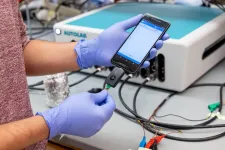Peptide could allow medical marijuana to relieve pain without side effects
2021-05-12
(Press-News.org) Many people live with chronic pain, and in some cases, cannabis can provide relief. But the drug also can significantly impact memory and other cognitive functions. Now, researchers reporting in ACS' Journal of Medicinal Chemistry have developed a peptide that, in mice, allowed Δ9-tetrahydrocannabinol (THC), the main component of Cannabis sativa, to fight pain without the side effects.
According to the U.S. Centers for Disease Control and Prevention, about 20% of adults in the U.S. experienced chronic pain in 2019. Opioids, the mainstay for severe pain management, are effective, but patients can easily become addicted to them. In some studies, medical marijuana has been helpful in relieving pain from migraines, neuropathy, cancer and other conditions, but the side effects present hurdles for widespread therapeutic use. Previously, researchers identified two peptides that disrupt an interaction between a receptor that's the target of THC and another receptor that binds serotonin, a neurotransmitter that regulates learning, memory and other cognitive functions. When the researchers injected the peptides into the brains of mice, the mice had fewer memory problems caused by THC. Now, this team, led by Rafael Maldonado, David Andreu and colleagues, wanted to improve these peptides to make them smaller, more stable, orally active and able to cross the blood-brain barrier.
Based on data from molecular dynamic simulations, the researchers designed two peptides that were less than half the length of the original ones but preserved their receptor binding and other functions. They also optimized the peptide sequences for improved cell entry, stability and ability to cross the blood-brain barrier. Then, the researchers gave the most promising peptide to mice orally, along with a THC injection, and tested the mice's pain threshold and memory. Mice treated with both THC and the optimized peptide reaped the pain-relieving benefits of THC and also showed improved memory compared with mice treated with THC alone. Importantly, multiple treatments with the peptide did not evoke an immune response. These findings suggest that the optimized peptide is an ideal drug candidate for reducing cognitive side effects from cannabis-based pain management, the researchers say.
The abstract that accompanies this paper can be viewed here.
The authors acknowledge funding from Rhodes Pharmaceuticals, Marie Skłodowska-Curie Research and Innovation Staff Exchange, the Spanish Ministry of Science and Innovation and La Caixa Foundation.
The American Chemical Society (ACS) is a nonprofit organization chartered by the U.S. Congress. ACS' mission is to advance the broader chemistry enterprise and its practitioners for the benefit of Earth and all its people. The Society is a global leader in promoting excellence in science education and providing access to chemistry-related information and research through its multiple research solutions, peer-reviewed journals, scientific conferences, eBooks and weekly news periodical Chemical & Engineering News. ACS journals are among the most cited, most trusted and most read within the scientific literature; however, ACS itself does not conduct chemical research. As a leader in scientific information solutions, its CAS division partners with global innovators to accelerate breakthroughs by curating, connecting and analyzing the world's scientific knowledge. ACS' main offices are in Washington, D.C., and Columbus, Ohio.
To automatically receive news releases from the American Chemical Society, contact newsroom@acs.org.
Follow us: Twitter | Facebook
INFORMATION:
ELSE PRESS RELEASES FROM THIS DATE:
2021-05-12
Alexandria, Va., USA -- COVID-19 was declared a global pandemic in March 2020 and given an incomplete understanding of the transmission of SARS-CoV-2 at that time, the American Dental Association recommended that dental offices refrain from providing non-emergency services. As a result, 198,000 dentists in the United States closed their doors to patients. The study "Sources of SARS-CoV-2 and Other Microorganisms in Dental Aerosols," published in the Journal of Dental Research (JDR), sought to inform infection-control science by identifying the source of bacteria and viruses in aerosol generating dental procedures.
Researchers at The Ohio State University College of Dentistry, Division of Periodontology, Columbus, USA, tracked the origins of microbiota in aerosols generated during treatment ...
2021-05-12
Are you empathic, generous and altruistic? In short, do you possess that specific personality trait defined as agreeableness in the language of psychologists? New research from SISSA recently published in the journal NeuroImage sheds light on brain mechanisms underlying this trait.
The study showed that detached and individualistic subjects seem to process information associated with social and non-social contexts in similar ways, as demonstrated by similar activation patterns in the prefrontal cortex, whereas in more agreeable subjects the activation patterns ...
2021-05-12
Peri-implantitis, a condition where tissue and bone around dental implants becomes infected, besets roughly one-quarter of dental implant patients, and currently there's no reliable way to assess how patients will respond to treatment of this condition.
To that end, a team led by the University of Michigan School of Dentistry developed a machine learning algorithm, a form of artificial intelligence, to assess an individual patient's risk of regenerative outcomes after surgical treatments of peri-implantitis.
The algorithm is called FARDEEP, which stands for Fast and Robust Deconvolution of Expression ...
2021-05-12
When Museums closed their doors in March 2020 for the first COVID-19 lockdown in the UK a majority moved their activities online to keep their audiences interested. Researchers from WMG, University of Warwick have worked with OUMNH, to analyse the success of the exhibitions, and say the way Museums operate will change forever.Caption: Compton Verney's homepage for the Cranach exhibition which opened in March 2020 Credit: Compton Verney
The cultural impact of the COVID-19 pandemic has been analysed by researchers from WMG, University of Warwick in collaboration with OUMNH (Oxford University Museum of Natural History) who in the paper, 'Digital Responses ...
2021-05-12
An international research team led by the University of Cologne has succeeded for the first time in connecting several atomically precise nanoribbons made of graphene, a modification of carbon, to form complex structures. The scientists have synthesized and spectroscopically characterized nanoribbon heterojunctions. They then were able to integrate the heterojunctions into an electronic component. In this way, they have created a novel sensor that is highly sensitive to atoms and molecules. The results of their research have been published under the title 'Tunneling current modulation in atomically precise graphene nanoribbon heterojunctions' in Nature Communications. The work was carried out in close cooperation between the Institute for ...
2021-05-12
BOSTON - (May 12, 2021) - Scientists are rapidly gathering evidence that variants of gut microbiomes, the collections of bacteria and other microbes in our digestive systems, may play harmful roles in diabetes and other diseases. Now Joslin Diabetes Center scientists have found dramatic differences between gut microbiomes from ancient North American peoples and modern microbiomes, offering new evidence on how these microbes may evolve with different diets.
The scientists analyzed microbial DNA found in indigenous human paleofeces (desiccated excrement) from unusually dry caves in Utah and northern Mexico with extremely ...
2021-05-12
Surface plasmon polaritons (SPPs) are highly localized surface waves on the interface between metal and dielectric in the optical frequency band. SSPs do not naturally exist in the microwave and terahertz frequencies, so "spoof" surface plasmon polaritons (SSPPs) are necessary for operations in those lower frequency bands.
Like optical SPPs, microwave SSPPs exhibit highly localized electromagnetic fields, subwavelength resolution, and extraordinary field confinement. Therefore, SSPP transmission lines (TLs) have been proposed as novel types of microwaveguides that offer new solutions for miniaturization, ...
2021-05-12
BOSTON - During the development and progression of Alzheimer's disease, a protein called tau accumulates and spreads in the brain. Understanding the mechanisms behind tau spread--and its consequences--may point to new prevention and treatment strategies for Alzheimer's disease and other forms of dementia. New insights now come from research that was led by investigators at Massachusetts General Hospital (MGH) and involves an anesthetic known to affect cognitive function. The findings are published in Communications Biology.
The scientists note that inflammation plays an important role in Alzheimer's disease, and microglia--immune cells that reside in the brain--are thought to be involved in this process by producing an ...
2021-05-12
Since the discovery of Alzheimer's disease over a century ago, two hallmarks of the devastating illness have taken center stage.
The first, known as amyloid plaques, are dense accumulations of misfolded amyloid protein, occurring in the spaces between nerve cells. Most efforts to halt the advance of Alzheimer's disease have targeted amyloid protein plaques. To date, all have met dispiriting failure.
The second classic trait has, until recently, received less scrutiny. It consists of string-like formations within the bodies of neurons, produced by another crucial protein-- tau. These are known as neurofibrillary tangles.
In a new study, researchers with the ASU-Banner Neurodegenerative Disease Center at the Biodesign ...
2021-05-12
PHILADELPHIA--A low-cost, rapid diagnostic test for COVID-19 developed by Penn Medicine provides COVID-19 results within four minutes with 90 percent accuracy. A paper published this week in Matter details the fast and inexpensive diagnostic test, called RAPID 1.0 (Real-time Accurate Portable Impedimetric Detection prototype 1.0). Compared to existing methods for COVID-19 detection, RAPID is inexpensive and highly scalable, allowing the production of millions of units per week.
Despite the urgency of the pandemic, most available methods for COVID-19 testing use RT-PCR--reverse transcription polymerase chain reaction--to detect ...
LAST 30 PRESS RELEASES:
[Press-News.org] Peptide could allow medical marijuana to relieve pain without side effects




